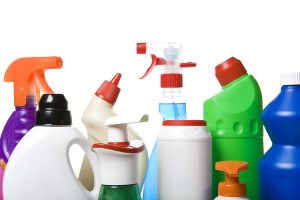A new study from Canada noticed that household cleaners could cause obesity in children. The study appeared in the Canadian Medical Association Journal on Sept. 18, 2018.
About the study that showed household cleaners could cause obesity in children
First, paediatricians followed along 757 infants from the midterm of the pregnancy through the after birth years. Second, the researchers inquired about what cleaning agents the mothers used in the home. Finally, they also weighed the children on each follow-up visit. In addition they took stool samples to analyze their bowel flora.
Findings of the study showing household cleaners could cause obesity in children
- The bacteria Lachnospiraceae are normal components of the gut microbiota. Lachnospiraceae were abundantly present in children whose mothers cleaned their home weekly with disinfectants. By the time the children were 3 years old they had an increased body mass index.
- Most noteworthy, there was a dose-response curve, which puzzled the researchers. In a word, the more often the mothers were cleaning the house with disinfectants, the more obese the children were.
- Similarly, there also was a significant difference, if the cleaning agents were washing detergents without the bacteria-killing ingredients. Moreover, eco-friendly detergents did the same thing. In both cases the children’s weight at age 3 was normal and the gut bacteria had the normal balance of stool bacteria.
- Around 3 years of age children’s gut flora is established for the rest of their lives and stays constant.
More about gut flora and childhood obesity
- The gut flora has an intimate relationship to our immune system. The gut flora also programs our metabolic system. It is common medical knowledge for some time that Cesarean sections have an association with childhood obesity. In addition, exposure to prenatal and postnatal antibiotics as well as formula feeding have also been identified as high risk factors.
Criticism from the disinfectant industry
It did not take long before there was criticism from the industry. Richard Sedlak, executive vice president at the American Cleaning Institute commented to the study. He said that he was “disappointed at the sensational claims” from the authors of the study. The studies did not include what diet the children were on. He went on to say that proper use of disinfectants would contribute to healthy homes and infection control. Sedlak added: “Proper use of household cleaners and disinfectants are important contributors to infection control and healthy homes.” Moira K. Differding and Noel T. Mueller, both of the Department of Epidemiology at Johns Hopkins Bloomberg School of Public Health in Baltimore, defended the study as biologically plausible. Both had no involvement in the study.
Conclusion
What children or adults eat determines what their gut flora will be. It also determines how strong the immune system will be. But in addition children’s weight also depends on whether their mothers clean the house regularly with detergents with bacteria-killing ingredients or not. In this case the study demonstrated that their children were obese at the age of 3. This new study has started a discussion about whether or not it is right to suppress all the bacteria in our environment. The authors indicated that it is wiser to use washing detergents without the bacteria-killing ingredients or use eco-friendly detergents to clean the house. Children who grew up in houses cleaned with natural cleaning agents had a normal weight at the age of 3.







